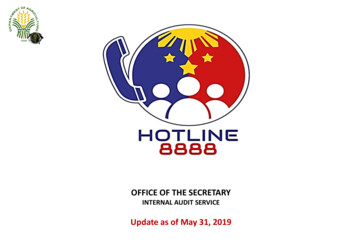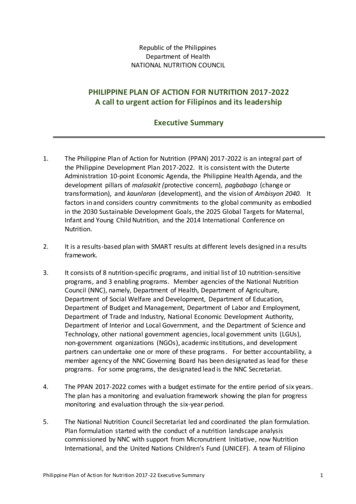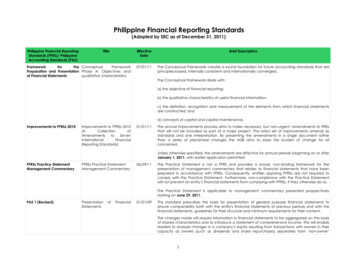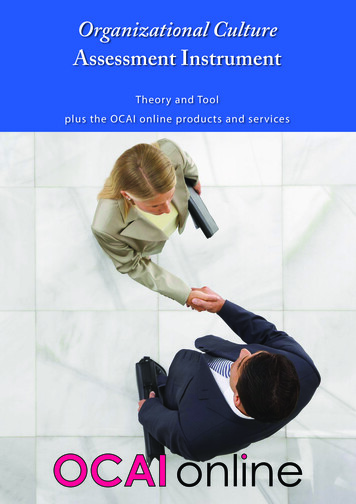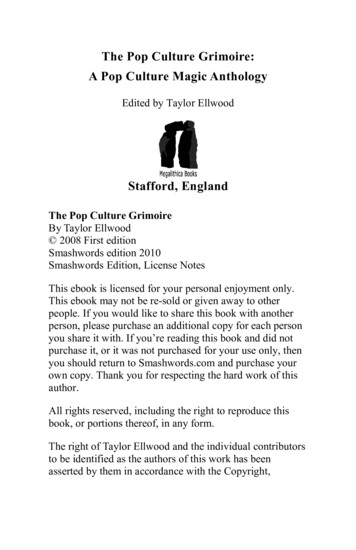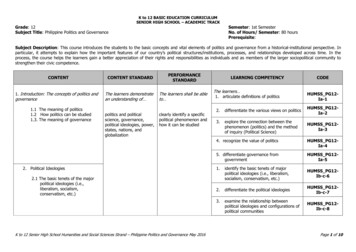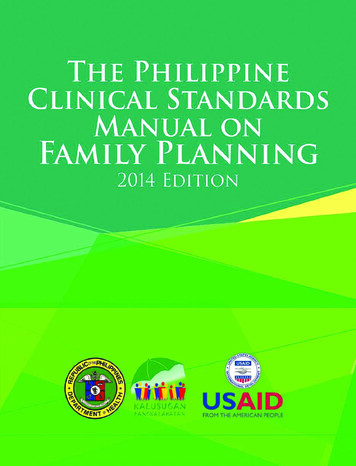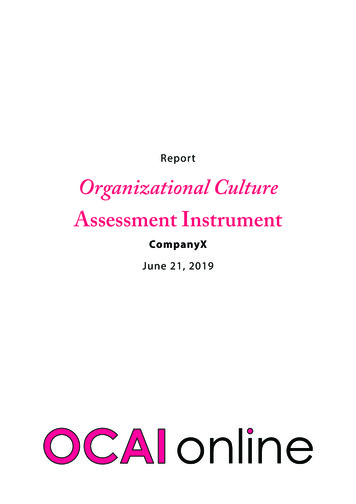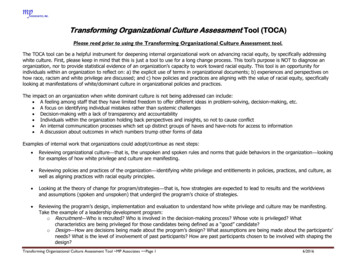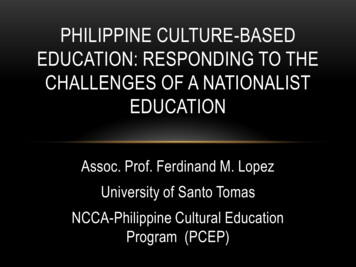
Transcription
PHILIPPINE CULTURE-BASEDEDUCATION: RESPONDING TO THECHALLENGES OF A NATIONALISTEDUCATIONAssoc. Prof. Ferdinand M. LopezUniversity of Santo TomasNCCA-Philippine Cultural EducationProgram (PCEP)
CONSIDER THIS:“It takes an entire village toeducate a child”
CULTURE AND DEVELOPMENTAll models of development are essentially cultural.They reflect a culture’s perception of the problemsfaced by society, and they incorporate solutions tothose problems based on that perception, anddeveloped from the cultural resources of the societyitself, in order to address the specific situations inparticular society.- Felipe M. De Leon Jr.
CALIBRATING OUR CULTURE-BASEDEDUCATIONRE- VIEWING CULTURE AND EDUCATION:
CULTURECulture is from the Latin root word colere meaning toinhabit which later developed to colonus or colonyLatin: coulter which means cultivation or tendingFrench couture which suggests fashionGermanic kultur which is synonymous with civilizationEnglish mime-word culchah which suggests refinementRaymond Williams “Keywords”
CULTURETotal complex of values, beliefs, practices,behaviour, patterns shared in common andtransmitted by a group of people from onegeneration to the next.- The U. P. Cultural Dictionary for Filipinos
CULTUREThe whole complex of distinctive spiritual, material,intellectual, and emotional features thatcharacterize a society or group. It includes not onlythe arts and letters, but also modes of life, thefundamental rights of human being, value systems,traditions and beliefs- UNESCO
THE SMILING CULTURE of thePHILIPPINES
ARCHIPELAGIC UNCONSCIOUS
BAYBAYIN SCRIPT
THIS IS A LAND BOTH FACT AND FICTION, WHERE GENERATIONS LEAVENO TRACE OF THEMSELVES AND EVERYTHING IS CONSTANTLY WIPEDOUT BY CLOCKWISE DESTRUCTION: TYPHOON, TSUNAMI, EARTHQUAKE,DROUGHT. BECAUSE WE HAVE NO MEMORY OF OURSELVES, WEREMEMBER ONLY THE LAST DELUGE, THE LAST SEISMIC UPHEAVAL.(ERIC GAMALINDA)
DAUNGAN, DAANAN, DALUYAN
POVERTY HAS THE FACE OF A FILIPINO
CULTURE OF ECONOMIC DEPRAVITYapi, busabos, alipin, salat sa yaman, dusta, aba, dukha,anak-pawis, maralitang taga-lungsod, kaawa-awa,kalatog- pinggan, anak-dalita, mahirap pa sa daga,biktima ng kahirapan, sumasala sa pagkain, patay-gutom,pulubi, pobre, hirap sa buhay, yagit, maralita, squatter,batang hamog, maglulupa, lupig, mumu, latak ng lipunan,laylayan ng lipunan, miserable, street-children, taonggrasa, purita kalaw, maji,
EDUCATION From the Latin root word educare meaning to rear or to foster;or educere which means lead forth. Is the acquisition of knowledge, skills, and attitudes that makepeople do better in their life-choices. Organized system of instructions designed to create meaningmaking sense of individual or communal life-ways, in the hopethat awareness, understanding and appreciation of life willmake life it more liveable.
OUR EDUCATIONAL SYSTEM IS VERY COLONIAL INCHARACTER, SO WHAT CAN WE DO ABOUT IT?
RANDY DAVID ON PHILIPPINE EDUCATION:Successive crises in the Filipino nation’s life have ledmany thoughtful analysts to suspect that the country’smain problem could be the dysfunctionality of the entireeducational system. This system, largely borrowed andimposed from without, has failed to spring roots in thesoul of the people. Instead of drawing strength from localmilieu, it arrogantly asserts its [colonial] superiority Inthe name of nationhood, it has suppressed nativesensibility. It continues to denigrate traditional folkwaysand wisdom in the name of global cosmopolitanism.
“We are a country without memory” – Francisco Sionil Jose“We are afflicted with a cultural version of Alzheimer's disease – N.V.M Gonzales“What we have is worse than Amnesia. It is Dementia.” – Bienvenido Lumbera
Our more than 300 years of Spanish Catholic religiousorientation taught us to forgive wrong-doings as anexpression of our Christian charity. The admonition is toforgive and forget. We have forgotten that forgiveness isanchored on justice, recompense, and restoration. How canwe forgive someone who never comes forward to admit andto acknowledge the infraction, crime, or sin? Recognition isthe conscious ability to account for the mistake, takingresponsibility for the consequences and learning theprecious lesson life teaches.
We have long-term and short-term memory loss because wedo not have any sense of history. History should have taughtus the important lessons of the past which must not beforgotten because they were written with the blood of ourcountrymen. We do not take seriously our historico-culturaleducation because up until today, our educational system isvery colonial in character. K-12 without a strong culturalbase will never become meaningful and relevant. It willnever heal the woundedness in our national psyche. Withoutcultural roots, without cultural memory, without cultural soulour educational system will fail, for in these culturalessentials we find meaning in being human, in being amember of a human and humane society.
HOW GOOD IS OUR CULTURAL MEMORY?ARE WE CULTURALLY LITERATE?
1904 WORLD FAIR AT ST. LOUIS
ST LOUIS EXPOSITION 1904
To us, history was taught without its lessons”-Jessie Carpio, “When Education Fails To Transform”
THE “WORLDING” OF THE WORLD: OR WHY IDON’T KNOW WHERE I AM
Political Economy
Global Divide
OUR HERITAGE OF SMALLNESS
CULTURE-BASED EDUCATIONIn a culture-based education, culture is the foundation which provides bothperspective and principle, framework and methodology, impetus and driver ofdiscussion, assessment and evaluation upon which skills, abilities andknowledge regarding the self and the world-at-large are constituted,mediated, and disseminated.Is both a philosophy of education and a teaching strategy where instructionand student learning are grounded in the unique cultural beliefs, values,norms, knowledge, heritage, practices, language, experiences ,and culturalexpressions of the community.
GEOGRAPHYHISTORYARTSHERITAGE
PHILIPPINE CULTURE-BASED EDUCATIONIn culture-based education, culture is the core and thefoundation of education, governance, and sustainabledevelopment. It seeks to develop among Filipinos a greaterawareness, understanding, and appreciation of our arts, history,geography, and heritage towards the evolution of aconsciousness that will improve the quality of our life. A CBE inthe Philippines envisions to develop A NATION OFCULTURALLY LITERATE AND EMPOWERED FILIPINOS whoare not only patriotic and ardent nationalists but at the sametime, responsible and committed global denizens as well.
MAKATAO, MAKABAYAN, tyFamilySelfCULTURE BASED EDUCATION
PEDAGOGY OF CULTURE-BASED EDUCATIONCulture-based education makes us engage the world – theknowledge systems, representations, discourses, andtheories produced from the logos-centres of the Empire –from the perspectives of the Filipinos.Culture-based education is our radical attempt atdecolonization – our postcolonial interrogation of our colonialhistory ,heritage, and identity – in order to come to terms withwho we are as a people and as a nation.
PEDAGOGY OF CULTURE-BASED EDUCATIONCulture-based education makes us knowledgeable andappreciative of our national and local history, heritage,language, and culture as expressions of the Filipino SoulCulture-based education builds bridges and promotesdialogues with our Southeast Asian neighbours throughcommon histories and shared cultural connections in theregion.
WHY CULTURE-BASED EDUCATION? Is culturally- rooted and contextualized Upholds the primary role of the community’s culturebearers in the teaching-learning process Nurtures a sense of identity and strengthens communityparticipation and sense of belonging It promotes an understanding and appreciation of culturalheritage and history It inculcates a sense of responsibility in developing,valuing, and protecting the environment
It develops cultural skills and competencies needed ininteracting with other people and culture Culture-based Education help us remember who we areand what we are as a people. It develops not only ouridentity as a nation, but more importantly, it instils in us asense of national pride. By preserving Cultural Memory through culture-basedlearning, we come upon a greater understanding of ourdestiny in our global society of human beings and theglobal community of nations. By facilitating the healing of our national wound throughculture-based education, we can now move-on, moveforward, and finally join other nations in their steadymarch to progress, marching to the beat of our own drum.
LEGAL FOUNDATIONS OF CULTURE-BASEDEDUCATION1987 Philippine Constitution: Article XIV states that the Stateshall establish and/or provide the following: Quality education accessible to all (Sec.1) Complete, adequate, and integrated and relevant education(Sec.2:1) Study of values such as patriotism, nationalism, etc., (Sec.3:2) Equal access to cultural opportunities through education (sec.18:1)
National Cultural Heritage Act of 2009 whichadmonishes the teaching and learning of culturalconcepts and procedures through culture-basededucation. Enhanced Basic Education of 2013: RA 10533(10.2) Education shall be gender, and culture-sensitive
CONSIDER THISIt is said that to awaken to critical consciousness, it is notenough to grieve what is wrong in the world; one needs tofall in love [ with what is right – in order to be able tocherish it, nurture it, fight for it and if it need be, to die for it.]
MARAMING SALAMAT PO
identity as a nation, but more importantly, it instils in us a sense of national pride. By preserving Cultural Memory through culture-based learning, we come upon a greater understanding of our destiny in our global society of human beings and the global community of nations.

